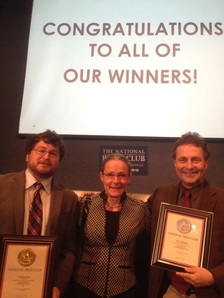2014 National Press Club Ann Cottrell Free Animal Reporting Award Winners
Print/Online:
Winner
“Gagged by Big Ag: pink slime, downer cows, grinding up live animals - and how politicians make sure no one squeals” - Ted Genoways,
Mother Jones
In his cover story, Ted Genoways takes a close look at the history and impact of what are called ag-gag laws, which are on the books in eight states and have been introduced in many more. These laws make it a crime to shoot undercover video or photographs of conditions in animal agriculture facilities.
According to Genoways, ag-gag laws are the result of coordinated efforts by industrial-scale meat producers to outlaw the kind of whistleblowing that allows the public to see horrific conditions and cruelty -- which has been damaging to their business. Genoways reports that these laws don’t just apply to animal activists but to all citizens including investigative reporters, and are seen by many as a violation of the First Amendment.
Genoways traced the role of agribusiness in promoting model legislation which was adopted with few modifications and introduced in statehouses across the country. Using more than 225 sources, from court records to committee meeting transcripts and countless interviews, Genoways paints a chilling portrait of how these business interests have used the state legislatures to prevent the public from seeing what is happening to animals on factory farms and have made it a criminal offense to blow the whistle on animal cruelty.
Winner
“Gagged by Big Ag: pink slime, downer cows, grinding up live animals - and how politicians make sure no one squeals” - Ted Genoways,
Mother Jones
In his cover story, Ted Genoways takes a close look at the history and impact of what are called ag-gag laws, which are on the books in eight states and have been introduced in many more. These laws make it a crime to shoot undercover video or photographs of conditions in animal agriculture facilities.
According to Genoways, ag-gag laws are the result of coordinated efforts by industrial-scale meat producers to outlaw the kind of whistleblowing that allows the public to see horrific conditions and cruelty -- which has been damaging to their business. Genoways reports that these laws don’t just apply to animal activists but to all citizens including investigative reporters, and are seen by many as a violation of the First Amendment.
Genoways traced the role of agribusiness in promoting model legislation which was adopted with few modifications and introduced in statehouses across the country. Using more than 225 sources, from court records to committee meeting transcripts and countless interviews, Genoways paints a chilling portrait of how these business interests have used the state legislatures to prevent the public from seeing what is happening to animals on factory farms and have made it a criminal offense to blow the whistle on animal cruelty.
Honorable Mention
“Bloody Skies: The Fight to Reduce Deadly Bird-Plane Collisions” - Eric Uhlfelder, NationalGeographic.com
Eric Uhlfelder’s reporting found that thousands of birds are systematically slaughtered every year to protect air travel, but yet, planes are affected on a daily basis by bird strikes. His research revealed that there is a better way - one that would eliminate the need for the massive killing and improve air safety at the same time -- the use of avian radar.
In interviews with experts, including pilot Chesley Sullenberger, who famously landed his airplane in the Hudson River after hitting a flock of geese, Uhlfelder learned that the use of avian radar could vastly improve flight safety and save the lives of millions of birds and other wildlife. He was among the first to report on this important and humane alternative.
2013 Winners
“Bloody Skies: The Fight to Reduce Deadly Bird-Plane Collisions” - Eric Uhlfelder, NationalGeographic.com
Eric Uhlfelder’s reporting found that thousands of birds are systematically slaughtered every year to protect air travel, but yet, planes are affected on a daily basis by bird strikes. His research revealed that there is a better way - one that would eliminate the need for the massive killing and improve air safety at the same time -- the use of avian radar.
In interviews with experts, including pilot Chesley Sullenberger, who famously landed his airplane in the Hudson River after hitting a flock of geese, Uhlfelder learned that the use of avian radar could vastly improve flight safety and save the lives of millions of birds and other wildlife. He was among the first to report on this important and humane alternative.
2013 Winners

